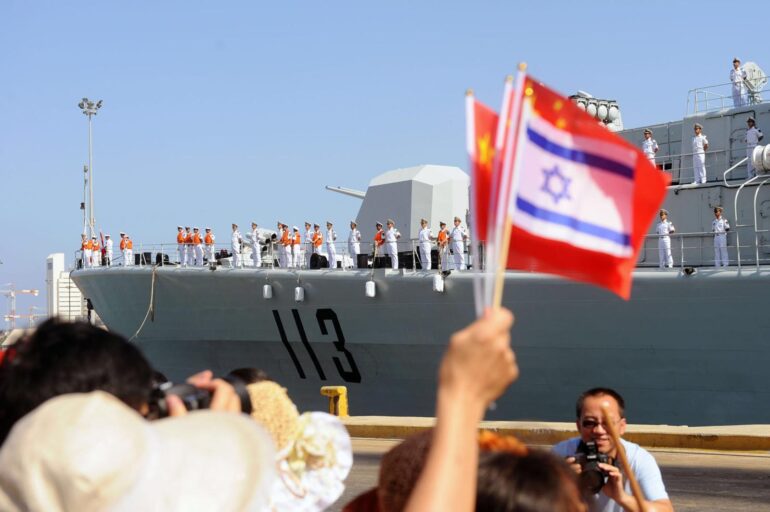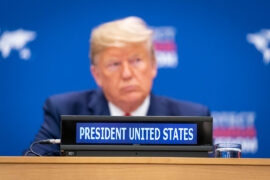Last week, US President Joe Biden demonstrated the hypocrisy of his administration’s foreign policy by pushing Israel to distance itself from the People’s Republic of China and Chinese investments in the Jewish state.
What was most ironic about Biden’s argument was that he made it on the grounds that such investment could threaten the State of Israel’s security and independence.
Chinese firms, especially in the technology and transportation sectors, have in recent years been investing heavily in Israeli development and have won bids for major local infrastructure projects. Washington generally regards this as a threat to the US stranglehold over Israeli development and security, which has in the past given the empire disproportionate influence over Jerusalem’s policies.
While still the world’s unipolar hegemon, it’s obvious that the United States has begun its historic decline as a global power and feels increasingly threatened by rising competition from the People’s Republic of China – especially on issues of trade and military deployment.
As with all struggles between rival powers on the world stage, client states, vassals, and protectorates are being drawn in to the escalating tensions between Washington and Beijing as they vie for global dominance.
The State of Israel has for the last few decades been an invaluable asset in Uncle Sam’s arsenal in the Semitic Region that Biden is loath to lose to the Chinese. It is thus no surprise that the administration seems to be anxiously setting aside whatever other demands it might have for Jerusalem in order to focus its leverage on cooling Israel’s relations with China.
There is a grain of truth in Biden’s admonition. It is essential that Israel take account of its dependence on foreign aid and investment. Since the early years of the state, successive Israeli governments have made themselves reliant first on French and then later US clientage in order to maintain our defense budgets and bolster our economy.
While some might argue that this dependency might have been necessary in the Jewish state’s infancy, we now have a greater ability for economic and military independence that should allow us to wean ourselves off such a crutch.
But contrary to Biden’s advice, Chinese investment might be just what the doctor ordered.
In recent weeks, with the buzz surrounding certain US political figures fighting to cut US funding for Israel’s Iron Dome missile defense system, voices in the Israeli establishment have surprisingly spoken out about the dangers that US military aid actually poses to Israel’s long-term security.
China’s interests in Israel – which shouldn’t be mistaken for a Chinese version of US imperial interests – could provide an opportunity to smoothly wean Israeli society from its current psychological subjugation to the United States, while building a healthier and more cautious relationship with a rising power.
We would of course be entering the relationship in a much stronger position than we did our current abusive relationship with Washington – which would allow for a more equal partnership from the start. The Chinese people also tend to hold a far more positive opinion of Jews than most American settlers – seeing themselves and us as ancient eastern civilizations brutally victimized by the West.
One can argue as to whether China today is a capitalist-imperialist or truly revolutionary actor on the global stage but the fact that Beijing threatens US dominance should be seen as revolutionary in and of itself. And if our current stage of Jewish liberation requires Israel’s freedom from the United States, a slight pivot towards China might be a prudent short-term strategy (this would of course require a separate analysis of Chinese interests in our region).
Just as the Cold War non-aligned nations engaged in partnership and investment with one or both of the superpowers while remaining firmly committed to their own independence and ability to chart their own course, Israel needs to take this opportunity to finally achieve independence from the forces of empire.
If Israel is meant to be a leading force in shaping the world, we’re going to ultimately step up to the plate and take the lead. No longer can we be content to follow Washington’s destructive example and we should be careful not to become trapped in a similar relationship with other powers.
By recognizing our role in history, and turning to our own identity and values to chart a new course for our people and the world, we can finally begin to work towards the next stage of our revolution.






Thanks to Aryeh Shapiro for his thoughtful and stimulating article, “Should Israel Pivot to China?”.
Israel can certainly benefit economically and in less tangible ways from China, but the costs to Israel’s national security in helping to further China’s global ambitions need to be considered carefully.
At least since the Korean War, China, like the USSR/Russia, has shown a propensity to stick it to Western-allied nations. Like it or not, Israel is universally considered a Western-allied nation. Israel’s neighbors, not so much. That is why the USSR/Russia has tended to side with Israel’s enemies in its wars (and why the US has mostly sided with Israel). China might likewise tend to favor Israel’s enemies in future conflicts.
Its aggressive moves against Taiwan and Japan are just the most recent sign of China’s increasingly evident ambitions to supplant the US as the world’s leading superpower, economically and militarily.
Other than China’s possible alignment with Israel’s enemies in future conflicts, why should Israel be concerned with China’s global ambitions? As just one example, China is far and away the leading producer and exporter of semiconductor chips. The US is just coming to realize now, through its supply-chain crisis, the strategic significance of a shortage of chips. That is just one area in which China holds strategic leverage over all other nations, including Israel.